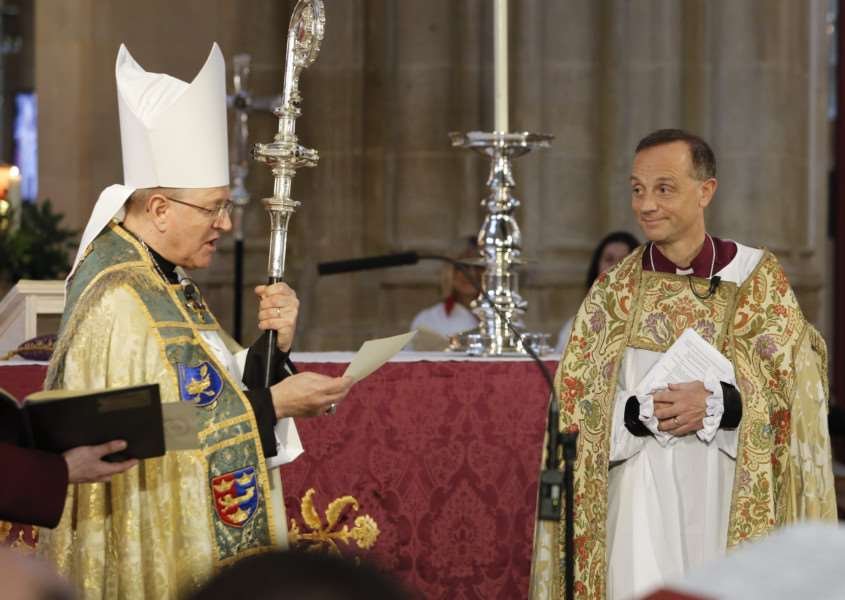And finally we get to how our Bishops treat the question of same-sex marriage in relation to Scripture. Or perhaps better: how they treat Scripture in relation to the question of same sex marriage… because as they have now both publicly stated, this is where they wish to see the process of change terminate.
Two common and inter-related myths are perpetuated in the videos, and for the sake of clarity, I’ll give a post to each (though this may result in some overlap). They are:
(i) That there are in fact only a few texts relating to the question in the first place, and that they are ambiguous, obscure and complex, which means that how we understand them is subject to our subjective bias and perhaps even our prejudice, and,
(ii) that those texts were authored in a fog of first century cultural context and prejudice. They almost certainly weren’t dealing with the kind of stable, faithful, relationships we see same sex Christian couples enjoying in our own day and age. They represent the authors’ best guess at the time, and were never meant to be representative of a timeless morality.
So, taking the first one first. What are we to make of the claim that there are only a few texts touching on the question of same-sex relationships?
Well, we spent a whole term here at MIE showing how the Bible from Genesis to Revelation is a story about a marriage: between Christ and the Church. That is what structures our understanding and experience of marriage in human society. Whilst any given culture may feel at liberty to redefine marriage as part of its suppressing the truth about God (Rom.1:18-21), the archetypal reality that gives shape to marriage as God intended it remains unchanged. The Bishops’ Proposals tacitly acknowledge this in drawing a distinction between ‘Holy Matrimony’ as defined by the Church (see the BCP’s ‘Form of Solemnization of Matrimony), and gloriously rooted in Scripture, on the one hand; and ‘civil’ marriage, as defined by the law of the land on the other. Yet the stubborn fact remains that the whole Bible is about marriage. To say there are only a few texts that speak to the question of marriage is simply wrong. The Bishop of Oxford, in his paper on the subject, ‘Together in Love and Faith’, recognises there is a profound tension between the teaching of the Bible, and the Bishops’ desire to introduce liturgy to bless those in a same-sex relationship. He writes:
‘…all of my pastoral instincts point to finding a way of interpreting the Scriptures that allows for greater love and support, tolerance and the blessing of [same-sex] partnerships, even where this interpretation seems, at first sight, to be in conflict with some of the obvious interpretations of key biblical passages’.
There is an honesty in this sort of statement at least (though I’d question his use of the word: ‘some’). Much greater honesty than the implication that somehow the Bible doesn’t really talk about this sort of thing very much. One noted example that has become common currency in the discussion is found in the works of a theologian called Walter Wink, who would like to see revision: ‘Where the Bible mentions homosexual behaviour at all, it clearly condemns it. I freely grant that. The issue is precisely whether that biblical judgment is correct’ (cited, Roberts, Together in Love and Faith, a response). Indeed, and it is worth noting that this has been the how the Bible has been interpreted by the Church throughout the centuries and in every cultural context. As to the question of whether it is correct… see the next blog!
Bishop Croft (Oxford) echoes the consensus of scholars on all sides of the current debate. The Bible simply does not support the extending of marriage to same-sex couples. Jesus affirms the Bible’s teaching on these matters, and does so explicitly, and condemns all other sexual activity as ‘immorality’. He doesn’t prohibit specific behaviours. He doesn’t need to - all such activity is already precluded by the Scriptures, which He came not to abolish, but to fulfil.
To circumvent that simple and straightforward observation about the Bible’s teaching about marriage falls far short of an authentically Anglican approach to the Bible. In spite of our own Bishops recognising that the Bible should interrogate us, it seems this is one area where they aren’t prepared to let it do so. There is not a single passage that affirms same-sex ‘marriage’, or sexual activity in any context. The best a revisionist can hope for is to negate, silence and marginalise the passages that do explicitly speak to this issue, and hope that no-one notices the positive teaching about marriage that reflects the relationship between Christ and Church (which, incidently, has far more to say to us about the structures of marriage than simply it intrinsically hetero-sexual nature - but that’s for another time).
Their framing of the discussion as if it is about a few random texts is simply wrong. This is a question about the whole sweep of Scripture, in which the passages that directly speak of sexual activity and marriage fit coherently and appropriately. To seek to restrict the discussion in the way our Bishops imply is, with respect, to distort the whole framework of Biblical revelation in this matter. Article 7 of the Church of England’s 39 Articles remains: ‘No Christian whatsoever is free from the obedience of the Commandments which are called Moral’.
…and are those texts ambiguous, obscure and complex?
No. The Church has long held to the idea of the ‘clarity’ of Scripture. This isn’t to say there aren’t parts of the Bible that are difficult to understand (see II Pet.3:16). Not all parts of the Bible are equally straightforward, and some parts of the Bible are ‘entry-level’, others require a measure of spiritual maturity before they yield their riches (see e.g. I Cor.3:2). We often have to meditate prayerfully on a passage for some time before we grasp its meaning and significance. But the Bible imparts it own understanding (Ps.119:130), and the Lord is at work by His Spirit revealing truth. This means that together, we approach Biblical literature with great confidence and joyful anticipation. Much of the Bible was written to the whole Church, and the whole Church is supposed to read it and make sense of it. Certainly, Jesus expected His people to have a working understanding of the Scriptures and chastised them when they failed to do so! Similarly, the Apostle Paul was clear: ‘we do not write you anything you cannot read or understand.’ (II Cor.1:13).
It was Mark Twain who once decried, ‘‘The researches of many commentators have already thrown much darkness on the subject and it is probable that if they continue, we shall soon know nothing at all about it’. Unfortunately this is as true in world of Biblical Interpretation as it is in any other field. There is surprisingly little evidence and a great deal of speculation about the nature of homosexual relationships in the first century. Undoubtedly some were abusive, rooted in power dynamics, fleeting encounters. But this is true of all experiences of sexual activity. To claim that this was the only experience of same-sex relationships can’t be justified. At best it is an argument from silence, though there are strong arguments that this was not the case. There is an interesting incoherence in the revisionist position. On the one hand wanting to suggest that there have always been loving, stable, committed homosexual relationships when arguing that this is a constant feature of human experience, but suggesting that the Bible’s teaching knows nothing of such relationships when arguing that Scripture doesn’t speak against it.
Apart from anything else, there is nothing new under the sun. There has always been a vast array of sexual experiences and relationships. They may have been recognised, celebrated, illegalised or ignored by culture. But people are people. They always have been.
…and is how we understand them subject to our own bias and prejudice?
This is one of the more far-reaching suggestions in the video. I had to stop and replay it a few times to make sure I hadn’t misheard. Not only is the claim made, but Cranmer of all people is enlisted to the cause: ‘what the heart desires, the will chooses and the intellect justifies’. Of course, Cranmer’s point (and the European Reformer, Melancthon’s before him) was that we therefore had to guard our hearts and ensure that they were oriented to delight in holiness, purity and righteousness. This, for the Reformers, was the pastoral reality and responsibility that their understanding of human nature demanded. And, for the record, this was understood as a prerequisite for understanding God’s revelation of Himself. For our Bishops, everything is turned on its head. Rather than leading to clarity, it serves to obscure the truth. Those who want to be conservative (or are shaped by a conservative background) will be theologically and ethically conservative. Though importantly the knife cuts both ways: those who want to be revisionist (or who come from a liberal background) will be revisionist. ‘Often’ we are assured by our Bishop, ‘reasoning comes into this rather late in the day’.
But more seriously, do our Bishops think that we cannot be trusted to understand the Bible because we are locked into a self-fulfilling, pre-determined theological disposition in a way that precludes the idea of the Spirit breaking through our prejudices and teaching us truth through the Scriptures. Which is of course, precisely what Christians believe can and must happen as they engage with the inspired Word of God. Such a bleak prospect for being able to trustworthily handle the Bible is somewhat out of step with the Spirit’s own expectation of pastors (e.g. II Tim.2:15)… and with that of reason and tradition… and of our own experience as Christians.
The way the Cranmer quote is introduced to the conversation has precisely the opposite effect to what Cranmer intended. Cranmer’s confidence in the Bible as the Word of God is boundless. He has an incredible conviction that if he can just get the Bible into the hands (and heads and hearts, and souls) of the people (which he seeks to do through the structures of worship he developed in the BCP), then the Spirit will change our hearts, and therefore our will and minds. For our Bishops, it seems more a way of undermining that confidence, and sowing uncertainty in its place. This total loss of confidence in our Spirit-inspired ability to interpret Scripture faithfully finds expression again and again. ‘Scripture isn’t as straightforward as I thought’… and we are told variously that the Bible (on this issue at least) is ambiguous, complicated, and that there are other interpretations. But not all interpretations are equal, and in the midst of such confusion, it is clear that we can’t be trusted with the Bible, because our own prejudice blinds us to its meaning.
One of the immense recoveries of the Reformation, and one that is built into Anglicanism, properly understood, is the putting of the Scripture in the hands of the people. It is a dangerous idea. In medieval Catholicism the clerics deprived the people of the Bible, because they couldn’t be trusted to understand it properly. Do we need to fight that battle again?





















